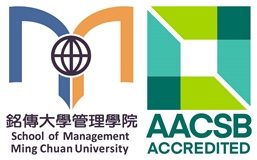
Vision
Innovation, Professionalism, Collaboration with Industry.
Mission
To integrate academic and experiential learning to develop students’ capacity as ethical and competent management professionals with global perspectives, while pursuing quality in research and excellence in teaching, learning, and service.
Dean Hwang academically focuses on areas of data envelopment analysis (DEA), performance evaluation & management and business research methods. He has applied DEA to measure managerial performance and efficiency across various ranges of industry.

Vision
The School of Management (SOM) strives to be a renowned management school focusing on innovation, professionalism, and collaboration with industry.
Mission
The mission of the SOM is to integrate academic and experiential learning to develop students’ capacity as ethical and competent management professionals with global perspectives, while pursuing quality in research and excellence in teaching, learning, and service.
The mission is supported by the following strategic priorities:
- Develop and enhance student critical thinking, scientific reasoning, and communication skills
- Promote and develop an understanding of effective management of ethical issues and social responsibility
- Raise student awareness of global issues
- Continuously improve faculty intellectual capital through the production of applied research
- Collaborate with local business and community
Value Statement
- Determined faculty who do not give up on students
- Excellent teaching, research, and professional service by faculty
- Innovation in curriculum
- Entrepreneurial spirit among students
- Partnerships with local business and community
Founded in 1957 by Dr. Teh-Ming Pao and Dr. Ying-Chao Lee, the first women's business school in Taiwan
Upgraded by the Ministry of Education to senior college status in 1990
Establish master's programs in Management, International Business, Finance, Accounting, Risk Management and Insurance, Statistics, and Economics
Deparptment of Financial Management changed its name into Department of Finance in 1996.
銘傳管理學院改制為銘傳大學設立企管系博士班
Upgrated to Ming Chuan University in 1990
Establish Ph.D program in Business Administration
Department of Insurance changed the name to Department of Risk Management and Insurance
Establish Executive MBA Program
Establish International MBA program
管理研究所與企業管理學系合一
Establish Part-Time MBA Program in Accounting
經濟系與統資系轉至社會科學院
| Briefing History |
| In 1957, Ming Chuan Commercial Junior College for Women was founded to fulfill a huge demand for a competent office workforce. The college offered applied programs in Secretary Science, Commercial Design, Banking, Insurance, Accounting and Electronic Data Management. In 1990, with approval from the Ministry of Education, Ming Chuan Commercial Junior College for Women was promoted to Ming Chuan College of Management, a co-educational senior college. It began to offer bachelors’ and masters’ degree programs in Management, Accounting, Economics, Finance, and Communication Management. In 1997, Ming Chuan College of Management was promoted to university status as Ming Chuan University. The name “School of Management” came into being in 1997, consisting of departments of Business Administration, International Business, Finance, Accounting, Risk Management and Insurance, Applied Statistics and Information Science, and Economics. In Spring 2016, the Economics Department and the Applied Statistics and Information Department were transferred to the School of Social Science for better mission alignment. |
| Mission |
| Upholding the Ming Chuan University mission of “attending to all students with parental care, support and guidance,” School of Management at MCU aims to serve the Greater China community and beyond by providing a stimulating learning environment that develops management professionals engaged in both academics and their profession, who possess ethical attitude, team spirit, and global perspective through excellent teaching and practice-oriented research. 1.Develop an innovative curriculum to train graduates with academic and professional knowledge, skills, and ethical attitude. 2.Combine local and western management knowledge with focus on practice-oriented research to enhance the development of our graduates and the competitiveness of industry. 3.Nurture graduates as competitive management professionals to be favored applicants among local and international enterprises |
| Learning Goal |
| Ethics: Upon graduation, students will be able to recognize ethical issues and understand the impact of any particular issue on various stakeholders. Communication: Upon graduation, students will be able to communicate effectively in writing and oral presentations. Global Perspectives: Upon graduation, students will be able to be aware of global issues affecting business. Critical Thinking: Upon graduation, students will be able to be critical thinkers. |
